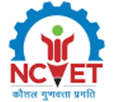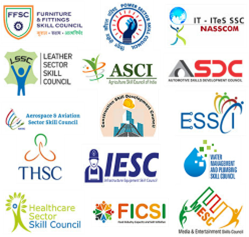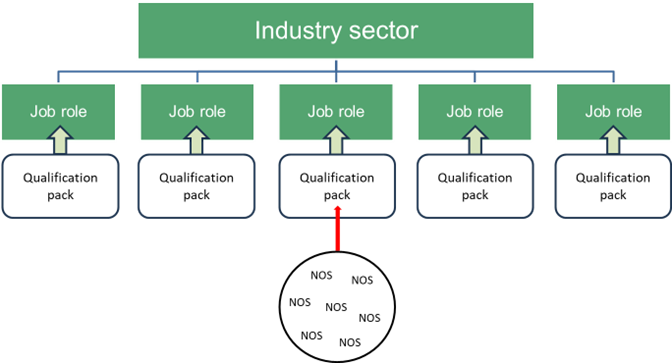目次
- 国家技能開発公社(National Skill Development Corporation(NSDC))
- 全国職業教育訓練協議会(National Council for Vocational Education and Training(NCVET))
- セクタースキルカウンシル(Sector Skill Councils(SSCs))
- イースクエアのインド進出・展開支援
- National Skill Development Corporation(NSDC)
- National Council for Vocational Education and Training(NCVET)
- Sector Skill Councils(SSCs)
※Please scroll to the bottom of the page for the English version.
人口と経済が成長するインドにおいて、標準化された技能と質の高い職業訓練の必要性がかつてないほど高まっています。インドでは、このニーズに対応するため、国家技能開発公社(NSDC)や国家職業教育訓練評議会(NCVET)など、数多くの機関が設立されています。この2つの機関は、インドの約40の産業部門をカバーする自律的な業界主導の技能部門評議会(Sector Skill Councils)などの組織と協力し、雇用主が資格のある労働者を見つけることができるようにし、国中の労働者が同じ認定レベルで働けるようにしています。
国家技能開発公社(National Skill Development Corporation(NSDC))

NSDCは、インドの会社法に基づき2008年に設立された非営利の公開有限責任会社で、PPP(Public Private Partnership:官民パートナーシップ)として財務省によって設立されました。インド政府(技能開発・起業省を通じて)と民間セクターがそれぞれ49%と51%の株式を保有しており、技能開発を促進することを目的としています。また、拡大可能で収益性の高い職業訓練イニシアチブを構築するため、技能訓練を提供する企業、会社、組織に資金を提供しています。NSDCが可能にする支援システムは、品質保証、情報システム、トレーナー養成アカデミーに重点を置いており、NSDCが開発したモデルは民間セクターのイニシアチブを強化・支援しています。
全国職業教育訓練協議会(National Council for Vocational Education and Training(NCVET))

NCVETは、2018年にインド政府によって設立され、2020年8月から本格的に稼働している規制機関です。NCVETは、基準の設定、包括的な規制の策定、職業教育・訓練・スキリングエコシステムの改善を目的とした包括的な国家規制機関としての役割を果たしています。その主な目的は、産業界との強力な連携を確保し、職業教育訓練の質と成果を高める効果的な規制を実施することです。
NCVETの任務には、1) 授与機関(AB)、評価機関(AA)、技能関連情報提供機関(SIP)の認定、2) 技能開発・起業省(MSDE)との協議による、ABおよびAAとしての技能大学に関する規定およびガイドラインの策定、3) 国家技能資格枠組み(NSQF)の確立および国家資格登録簿(NQR)の管理、4) NSQFに沿った資格の承認、などが含まれます。
セクタースキルカウンシル(Sector Skill Councils(SSCs))

SSCは、産業界、労働界、学術界の関係者を結集し、産業界の需要と最新の技能水準とのギャップを埋めるための国家的パートナーシップ組織です。SSCは、NSDCがシード資金を提供することで発足/インキュベートされますが、自律的な組織として運営されています。40近いSSCがNSDC理事会によって承認され、その運営評議会には600を超える企業代表が参加しています。SSCの役割には、1) スキル開発ニーズの特定、2) セクターのスキル開発計画の策定、3) スキル/コンピテンシーの基準および資格の設定、4) NSQFに準拠した加盟、認定、試験、認証のプロセスの標準化; 5) クオリフィケーションパック(QP)/国家職業標準(NOS)に沿った研修プログラムに対するスキルに基づく評価と認証の実施、6) NSDCや各州と連携したトレーナー研修の計画と促進、7) 卓越したアカデミーの推進、などがあります。
SSCの最も重要な責務のひとつは、国家職業基準(NOS)の作成です。NOSは主にSSCが雇用主と協力して作成するもので、必要なスキルだけでなく、ある職業で実際に何ができなければならないかを、達成すべき成果も含めて記述したものです。NOSは、各産業分野のあらゆる職務のQPを構築するために使用され、そのための訓練プログラムも含まれます。各NOSは、職務における重要な機能の1つを定義しており、その一部を構成する資格パックと職務は、日本全体に適用されます。

産業部門におけるジョブロールの創出
NSDC、NCVET、SSCが協力することで、ある産業で必要とされるスキルが雇用者と労働者の双方にとって同じように理解されていることが保証されます。また、こうしたスキルの標準化は、実際的なメリットももたらします。雇用者にとっては、ある職務に必要な資格を持つ労働者を雇用しやすくなり、労働者にとっては、同じ資格を持つ労働者のスキルが世界的に認知されることになります。インド経済の継続的な成長に伴い、職業適性の追加・進化に対するニーズは確実に高まり続けるでしょう。
イースクエアによるインド職業訓練コース設立支援のご紹介
イースクエアは、NSDC(National Skill Development Corporation)、NCVET(National Council for Vocational Education and Training)、およびインド鉄鋼セクタースキルカウンシル(Indian Iron and Steel Sector Skill Council:IISSSC)と連携し、静岡県の株式会社木村鋳造、ならびにベンガルールのカルナタカ・ドイツ技術訓練学校(Karnataka German Technical Training Institute:KGTTI)と共同で、インドの国家職業訓練基準に準拠した職業訓練コースの設立を支援しました。
本取り組みにより、日本企業は以下のような価値を得ることができます。
- 現地人材のスキルレベル・育成ニーズの深い理解
- 日本式研修手法の導入による、自社に適した人材育成の実現
- 中長期的な優秀人材の確保に向けた基盤形成
インドにおける職業訓練の活用や、現地人材の採用をご検討中の企業様は、ぜひお気軽にお問い合わせください。
イースクエアのインド進出・展開支援
弊社は、2010年よりインドを始めとする開発途上国・新興国での日本企業のビジネス展開を市場調査、製品・技術開発(ローカライゼーション)、現地パートナーの発掘、テスト販売、ビジネスモデル構築・改善、公的機関などの補助金・助成金など申請など、お客様のニーズに合ったサポートをご提供します。インドでの多数のプロジェクト経験に加え、様々な民間企業でのビジネス経験を有する弊社コンサルタントのノウハウや現地ネットワークをフル活用し、企業様のインドでのビジネス展開をオーダーメイドでご支援します。
ご要望がある方は、以下よりお問い合わせください。
中小企業の海外展開を強力にバックアップします
進出先選定、市場調査、実現可能性調査(F/S)、公的機関の支援活用など、事業の立ち上げをワンストップでご支援します。 海外展開にご関心がある方はお気軽にお問い合わせください。
Vocational Training in India
With India’s growing population and economy, the need for standardized skills and quality vocational training is higher than ever. India has established a number of institutions to address this need including the National Skill Development Corporation (NSDC) and the National Council for Vocational Education and Training (NCVET). These two bodies work together with organizations such as the autonomous industry-led Sector Skill Councils (SSCs), which cover nearly 40 of India’s industry sectors, to ensure employers can find qualified workers and that workers across the country perform to the same certified level.
National Skill Development Corporation(NSDC)

NSDC is a not-for-profit public limited company incorporated in 2008 under India’s Companies Act. It was set up by the Ministry of Finance as a Public Private Partnership (PPP) and its capital shareholders include the Government of India (through the Ministry of Skill Development & Entrepreneurship (MSDE)) and the private sector, which hold 49% and 51% shares, respectively. NSDC aims to promote skill development by catalyzing the creation of large, quality, for-profit vocational training institutions. It also provides funding to enterprises, companies and organizations that provide skill training to build scalable and profitable vocational training initiatives. The support system enabled by NSDC focuses on quality assurance, information systems, and train-the-trainer academies, and models developed by NSDC enhance and support private sector initiatives.
National Council for Vocational Education and Training(NCVET)

NCVET is a regulatory body established by the Government of India in 2018 and has been fully operational since August 2020. NCVET serves as an overarching national regulator with the aim of setting standards, developing comprehensive regulations, and improving the vocational education, training, and skilling ecosystem. Its primary objective is to ensure strong industry interfacing and implement effective regulations that enhance the quality and outcomes of vocational education and training.
NCVET’s mandate includes: 1) Recognizing Awarding Bodies (ABs), Assessment Agencies (AAs), and Skill-related Information Providers (SIPs); 2) Establishing regulations and guidelines for Skill Universities as ABs and AAs in consultation with MSDE; 3) Anchoring the National Skills Qualification Framework (NSQF) and maintaining the National Qualification Register (NQR); and 4) Approving NSQF-aligned qualifications and National Occupational Standards (NOSs) developed by ABs, including SSCs, among other activities.
Sector Skill Councils(SSCs)

SSCs are national partnership organizations that bring together industrial, labor, and academic stakeholders to bridge the gap between industry demands and the latest skilling standards. SSCs are initiated/incubated with seed funding by NSDC but operate as autonomous bodies. Nearly 40 Sector Skill Councils have been approved by the NSDC Board and their Governing Councils include over 600 corporate representatives. The role of SSCs is broad and includes 1) the identification of skill development needs; 2) the development of sector skill development plans; 3) the setting of skills/competency standards and qualifications; 4) the standardization of processes for affiliation, accreditation, examination, and certification in accordance with NSQF; 5) the implementation of skill-based assessment and certification for Qualification Pack (QP)/NOS-aligned training programs; 6) the planning and facilitation of training of trainers along with NSDC and states; and 7) the promotion of academies of excellence, among other activities.
One of the most important responsibilities of SSCs is the creation of NOSs, which are mainly developed by SSCs in collaboration with employers. NOSs describe not just required skills but what a person must actually be able to do in a given occupation, including outcomes that must be achieved. NOSs are used to build QPs for every job role in each industry sector, including training programs for these. Each NOS defines one key function in a job role and the qualification packs and job roles that they form a part of apply to the whole country.

The Creation of Job Roles for an Industry Sector
The collaboration between NSDC, NCVET, and the SSCs provides assurance to employers and workers alike that the skills required in a given industry are understood in the same way by both parties. The standardization of these skills also provides practical benefits. For employers, a worker qualified in a given job role is easier to hire and, for workers, that same qualification ensures that their skills are universally recognized. With the continued growth of India’s economy, the need for additional and evolving vocational aptitude will certainly continue to rise.

The Karnataka German Technical Training Institute (KGTTI) in Bengaluru
In collaboration with NSDC, NCVET, and the Indian Iron & Steel Sector Skill Council (IISSSC), E-Square is currently working with Kimura Foundry Co., Ltd. of Shizuoka prefecture and the Karnataka German Technical Training Institute (KGTTI) in Bengaluru to establish a vocational training course in India that complies with national vocational training requirements. This kind of course can be a useful way for Japanese companies to become familiar with local standards and practices while exploring the potential of expanding their businesses overseas and contributing to the development needs of Japan’s partner countries. We look forward to learning more about your company’s aspirations for overseas development and to discussing similar opportunities.
EXTENDED BODY:





